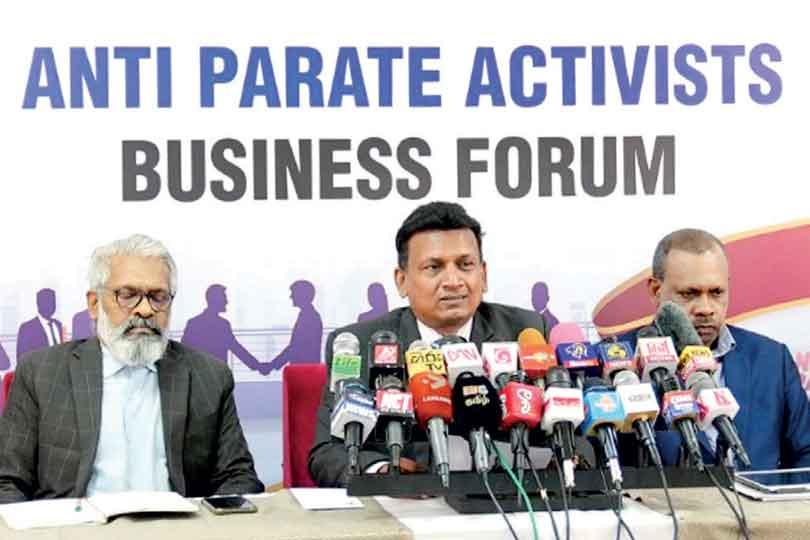10 Feb 2024 - {{hitsCtrl.values.hits}}

Sri Lankan Micro Small and Medium Chamber of Commerce Vice President G. Mahendra Perera addresses the media this week while the other officials look on
By Nishel Fernando
The Sri Lankan Micro Small and Medium Chamber of Commerce continues to remain irked with the Central Bank for its strong position on parate execution and this time took a step further by alleging the governor is misleading the government and public in this regard.
The chamber asserted that Central Bank Governor Dr. Nandalal Weerasinghe is painting the wrong picture regarding the execution data, which adds to the distressed SMEs’ woes.
Sri Lankan Micro Small and Medium Chamber of Commerce Vice President G. Mahendra Perera said Dr. Weerasinghe stating that there were 537 property expropriations under parate executions last year is incorrect, as it contradicts a recent gazette notification, which mentions a much higher figure.
“We are informed that from January 2023 to the end of January 2024, 1410 property acquisitions were made under the parate law,” he said, addressing a press conference in Colombo.
The Supreme Court recently, in a landmark ruling, unanimously held that the properties mortgaged to banks, not only by an actual borrower but also by a third party for the loan granted to the actual borrower, can be sold at an auction, to recover the unpaid loan and interest thereon.
The ruling sparked a debate and sections of the business community called for banks’ right of parate execution to be amended.
However, Dr. Weerasinghe resisted these calls by emphasising that the Central Bank was not ready to compromise the safety of public deposits and stability of the banking sector in favour of an insignificant number of “loud” debt evaders.
Perera stressed that the country’s micro, small and medium enterprise (MSME) sector, which was smoothly operating, became the victim of multiple crises and consequently, was forced to settle debt repayments from their properties and assets, as the banks moved to recovery actions at the end of the moratorium period declared by the Central Bank.
“The most important point here is that tens of thousands of people, who worked in these closed industries, have lost their jobs and hundreds of thousands of families have become orphans,” Perera said.
Further, he pointed out that the remaining MSMEs are operating at dire conditions, due to an increase in electricity bills, an increase in income tax, an increase in water bills and the most recent increase in the Value Added Tax. “It is our understanding that due to the short-sighted and repressive policies of the governor of the Central Bank, the small and medium-scale industries are closing down rapidly. If the government does not intervene directly, the industrialists and employees involved in them cannot be prevented from facing a very unfortunate situation,” added Perera. According to Peradeniya University Economics and Statistics Department Prof. Wasantha Athukorala, about 263,200 MSMEs across different industries in the country were forced to close down in the last four years. Among these closed MSMEs, 254,700 belonged to the micro sector, 7,300 were small companies and the remaining 1100 were medium-sized companies.
22 Nov 2024 9 hours ago
22 Nov 2024 22 Nov 2024
22 Nov 2024 22 Nov 2024
22 Nov 2024 22 Nov 2024
22 Nov 2024 22 Nov 2024